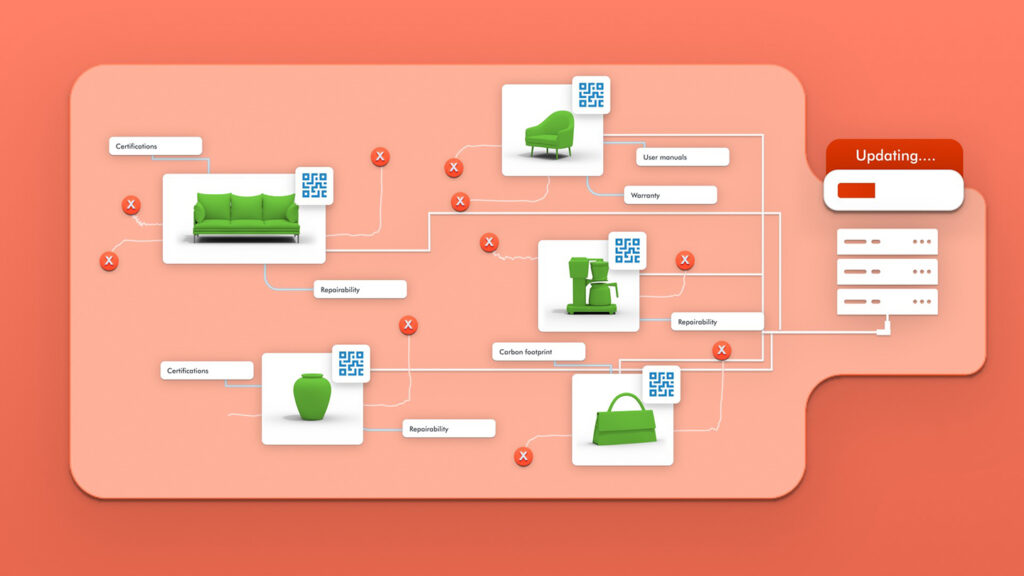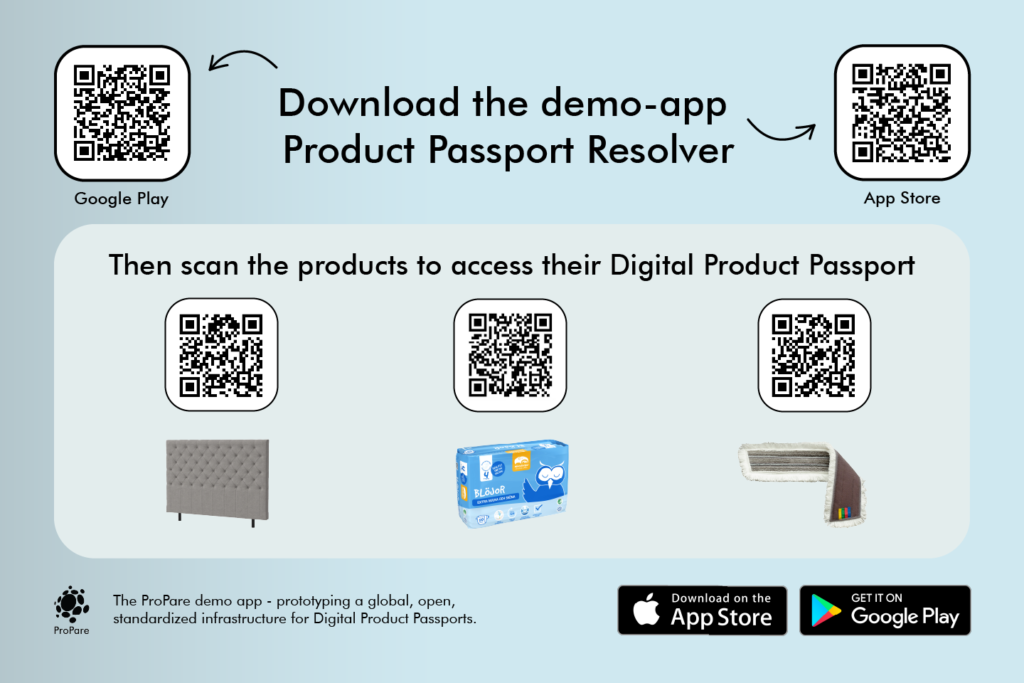Digital Product Passports – for public authorities and policy makers
The upcoming EU legislation Ecodesign for Sustainable Products Regulation (ESPR) will require most products on the European market to have a Digital Product Passport (DPP) containing data about product content and sustainability performance. DPPs have the potential to contribute to increased circularity, transparency, and traceability. In doing so, we together take important steps towards fulfilment of Agenda 2030. However, to ensure success, there is a need for pragmatic legislation and implementation, as well as practical solutions built on global, open, and competition-neutral standards. The ProPare prototype for such infrastructure shows how it could work in practice.

Digital Product Passports in the EU
Digital Product Passports are crucial for a sustainable transition. They will benefit companies that want to be at the forefront and help consumers to make sustainable choices at the time of purchase and throughout the product’s lifetime. They will also increase transparency between different actors in the supply chain and facilitate market surveillance for relevant public authorities. The Digital Product Passports are well in line with the all-inclusive initiative aimed at creating a circular and sustainable EU; the EU Green Deal and with Sweden’s Circular Economy Action Plan.
8 good reasons for Digital Product Passports
- Speed up the Sustainable Transition: The Digital Product Passports contribute to promoting more sustainable production and consumption with increased circularity, transparency, and traceability.
- Good for Business: DPPs benefit companies that want to be at the forefront and have the ambition to contribute to a sustainable transition.
- Increased Transparency: DPPs increase transparency and cooperation between different actors in the supply chain. They facilitate market surveillance for relevant public authorities, by providing all actors access to relevant data in real-time.
- Efficient Resource Management: DPPs will provide more efficient recycling and waste management and promote a circular use of materials and resources.
- Guiding the Consumer: DPPs will help consumers to make sustainable and well-informed choices at the time of purchase and throughout the product’s life cycle.
- More Efficient Administration: DPPs facilitate authorities in the work of ensuring compliance with current legislation. They enable relevant authorities to get a helicopter perspective, with the opportunity to identify hot spots where the risks of non-compliance are greatest.
- Healthy Competition on Equal Terms: DPPs will be mandatory for almost all products (except food and medicine) launched on the EU market – regardless of where they are produced.
- Simplifies Product Recalls and Reduces the Risk of Counterfeits: With DPPs, each product gets a unique identity that becomes traceable to whoever puts the product on the market. It makes counterfeiting more difficult and makes it possible to identify exactly which products on the market are to be recalled and if they have been returned.

Challenges & Risks
To ensure a successful implementation of Digital Product Passports, several risks must be addressed. One such is the use of centralized databases which typically store copies of data that easily become outdated, leading to poor data quality. Another risk is the use of different data-sharing standards, which can lead to systems not being able to communicate with each other. In addition, using IT solutions locked to a certain service provider can inhibit transparency. Implementation of DPPs must also ensure that companies can maintain their innovative and comparative advantages, while at the same time, sharing relevant product information. Finally, legislation must ensure that DPPs do not entail too much of an administrative burden and become too cost-driving.
The ProPare Solution
The ProPare prototype shows how a global, open, competition-neutral infrastructure for Digital Product Passports could work in practice. It demonstrates that it is possible to build an infrastructure that allows all actors to access relevant data in real-time. It enables companies to easily provide new data about the product during its life cycle, for example at the time of repair or recycling. This in turn helps consumers to make well-informed decisions, and in addition, relevant public authorities can track the product in real time.
By using existing technology in a new way with decentralized data sharing, the prototype avoids cost-driving databases and addresses the risk of non-compatible solutions. The prototype meets all the basic conditions in the EU’s ESPR and is a safe choice as an underlying infrastructure for Digital Product Passports.

Take Action
The upcoming legislation on Digital Product Passports provides a strong basis for more sustainable production and consumption. However, pragmatic, timely, and well-anchored implementation are keys to success.
- Ensure Global, Standardized Solutions: Ensure that the implementation of DPPs builds on a global, open, and standardized infrastructure, and enables a powerful implementation to create favorable conditions for a circular economy. A robust implementation of a global infrastructure is essential to avoid locking into incompatible solutions.
- Get Engaged Early On: Increase your knowledge base on DPPs; how will they work technically and practically, how should the implementation be done, and what consequences will the introduction have.
- Pragmatic Legislation: Ensure legislation is designed in a way that allows for implementation on a manageable scale, both in terms of choice of product groups and attributes, i.e. what data to include.
- Safeguard Competitiveness: Ensure that the implementation of DPPs protects corporate confidentiality, enabling companies to maintain their distinctiveness and competitiveness.
- Raise Awareness: Support companies in their journey towards useful product passports, by communicating the advantages to the public.
The ProPare Project
The ProPare project was carried out in broad collaboration between non-profit actors Axfoundation, Ecolabelling Sweden AB, GS1 Sweden and the Swedish Trade Federation, as well as trading companies Ahlsell, Dagab, Mio and technology developer Blue Cromos. Read more about the ProPare project.
FAQ
What is a Digital Product Passport? Will the law apply to all products? What does a “global and competition-neutral standard’ mean? How does a resolver work? The FAQ provides quick answers to some of the most frequently asked questions about product passports. Read more in the Q & A here.



